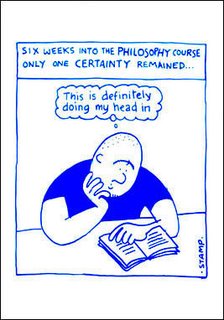
What is the difference between belief, knowledge, fact and certainty?
This is an important question when considering ambiguity and one that many previous philosophers have considered. Most famously John Dewey in The Quest for Certainty (1933), considered this and noted that Locke saw knowledge and certainty as co-existant, that to be certain is to know and that "the quest for certainty has always been an effort to transcend belief." (Chaper 2), belief being anything that we don't know to be 'true'. True therefore also equates with certainty and knowledge, a fact is knowledge with the certainty of truth. Knowledge therefore is usually seen as being superior to belief.
The idea that knowledge equates to fact and as such they must be true - more than just a belief. However knowledge is being continually updated. What was a fact 100, 50, 20, 10, 5 years ago or even yesterday may not be one now. All knowledge is an argument. Each argument justifies certain evidence which is in turn used to back up that argument. Facts are those arguments that we currently accept or assume to be correct in order to continue the debate or in the face of a lack of evidence to the contrary. In effect what we know is what we currently believe to be true. We can never be certain that any knowledge will not be superceded.
"We really only know, when we don't know; with knowledge, doubt increases." ~ Goethe
No comments:
Post a Comment